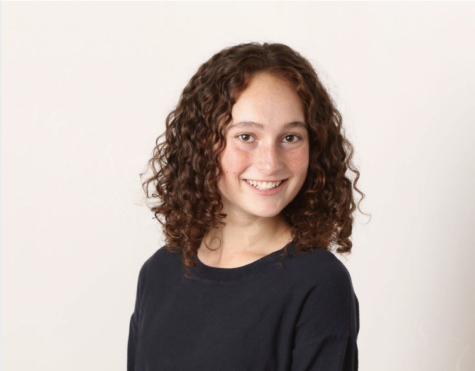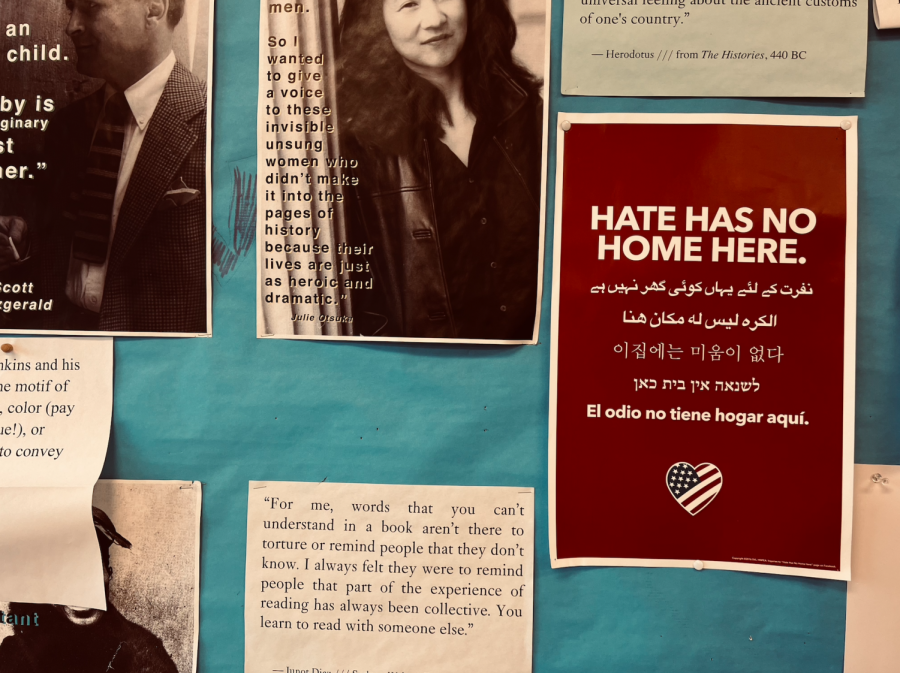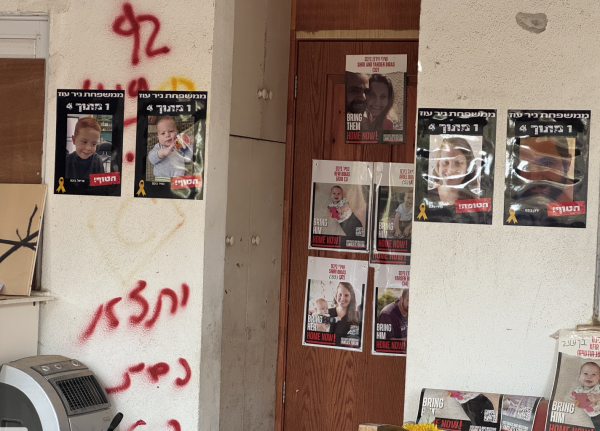Why Latin Should Not Have Selected Hoda Katebi for a ‘Difficult Dialogue’
A poster in one Upper School classroom reads, “Hate has no home here,” a sentiment worth embracing.
Note: The opinions expressed in this op-ed represent the perspectives of its authors, not the voice of The Forum.
Like many of our peers, we, as two co-Heads of Latin’s Jewish Student Connection, were pleased to learn earlier this week that our upcoming Upper School gathering would feature a moderated panel discussion in response to the ongoing protests in Iran, advocating for women’s rights. We looked forward to the opportunity to hear from women with close connections to the topic, to better understand its complexity, and its relation to other social movements.
We were disappointed, however, to learn that Hoda Katebi, one of the three women Latin chose to invite—in addition to her role as an activist in the fashion industry, a writer, and an entrepreneur—holds antisemitic views.
This panel was the first in a series of “Difficult Dialogues” that Upper School students will engage with this semester. Presumably, these conversations will bring a range of perspectives that force us to grapple with our own ideas of complex topics, a valuable practice indeed.
Even if this first conversation had nothing to do with Jewish people or antisemitism—topics of Israel or Judaism were never a part of the panel’s discussion or work—we disagree with some of our faculty and administration’s decision to provide any space to a woman who spews hate.
Where we draw the line between free expression and hate speech is a conversation so complex and important it has come before our U.S. Supreme Court. Free speech is valuable, but we do not think Latin should tolerate rhetoric that is cruel or encouraging of violence. To invite someone who produces just that, even to speak about an unrelated topic, is to decline to stand up to hatred.
When we asked members of Latin’s administration to remove her from the panel, they declined to do so, arguing, “Diversity of thought is a hallmark here at Latin,” and, “There is a reason why ‘difficult’ is part of the title of this series.”
Neither of us disagree with Latin’s effort to expose us to a gamut of opinions. We are grateful that it is a priority of Latin’s programming. So it is not a fear of disagreement that sparked our conversation with administrators. Rather, it is our belief that hate of any form should have no space in our school, nor should hateful individuals.
At the surface, Katebi openly opposes Israel’s government, a stance we don’t believe is inherently antisemitic. But Katebi disagrees with more than just Israel’s policies; she supports organizations that call for Israel’s annihilation, and she defames the country disproportionately, without sufficient support for her arguments. In short, Katebi’s anti-Israel advocacy becomes antisemitic. Here is how:
When Israeli soldiers responded to cross-border bombs from Gazan protesters into Israel with bullets in 2018, Katebi tweeted to her followers, “Your silence or ‘two sides’ b.s. is glaringly loud.” Her advocacy for a single story proves she was a poor choice for Latin’s “Difficult Dialogue.” To shut down the Jewish perspective as a non-starter in an instance of two-sided violence is antisemitic.
The Boycott, Divestment, and Sanctions (BDS) movement, which Katebi supports, aims to dismantle Israel as a Jewish state through a range of economic and social pressures against the country and its citizens. The campaign does not support Israeli-Palestinian alliances, promote a two-state solution, or encourage peace negotiations. It is a unilateral call for Israel’s obliteration.
Israel is the only country in the world scrutinized to the point of arguing for its extinction. It is not something we demand of even the most blatantly human-rights-violating countries. To ask Israel exclusively to abandon its UN-granted land, the only land in the world devoted as a Jewish haven, is antisemitic.
In addition to her praises for BDS, Katebi holds Israel to a standard higher than the rest of the world. In 2016, with no context or evidence to support her claim, Katebi tweeted, “Genocide is happening right now in Palestine, in Rohingya, etc.” While Israel is by no means immune to criticism for discrimination within its borders, to compare it to the situation in Myanmar is nothing short of obscene.
Myanmar’s 1982 Citizenship Law effectively bars Rohingya from becoming citizens. Israel currently has roughly 1.6 million Palestinian citizens, who share the same legal rights as any other Israeli citizen.
Amidst at least 9000 murders of Rohingya from 2016 to 2017, and widespread gang rape of Rohingya women, hundreds of thousands of Rohingya refugees, mostly children, fled violence in Myanmar. Katebi has also casually compared Israeli-Palestinian conflicts to the Holocaust. Israelis and Palestinians suffer devastating losses of young lives related to ongoing conflict, with a report of over 100 Palestinian deaths in 2022. The vast majority of Palestinian deaths caused by the Israeli military reportedly involved return of fire or counterterrorism raids. Katebi’s likening of Palestinian casualties to blood-thirsty genocide is only either severely ignorant or blatantly antisemitic.
Israeli policies or government, like those of any other country, might be a legitimate target for criticism. This condemnation is not necessarily antisemitic. Calls to erase the Jewish state or contribute to its demise, however, threaten the survival of Jewish populations. Latin can host those whose activism focuses on advancement of equity or betterment of human rights. Latin can even itself call out Israel, as it might call out our own country’s discrimination, violence, or imperfections. But—for dialogue over any topic—we cannot invite those whose speech distorts the truth for the sake of destruction.

Eden Raviv (‘23) is eager to bring relevant stories and perspectives to the Latin community in her second year as Editor-in-Chief. Eden joined The...

Ryan Rose (‘23) is a senior at Latin and is thrilled to serve as Media Editor. Starting his sophomore year, Ryan has loved writing a variety of local...




















































Emily Bernhardt • Jan 8, 2023 at 7:00 am
Having a problem with the state of Isreal is not the same as being antisemitic. I am glad Dr. June responded to this article. I am disappointed that this speaker was attacked, as Latin would benefit from hearing more women of color like her speak. When I was at Latin, I would have loved to attend this panel.
Inna Elterman • Jan 11, 2023 at 4:29 pm
No one is attacking the speaker. These students are expressing their opinion. If you feel that her views on Israel can be justified, they should also be allowed to have an opinion on her views. Furthermore, they have very eloquently commented on having a problem with state of Israel vs being anti-Semitic, if you take the time to read the article
Emily Bernhardt • Jan 16, 2023 at 12:24 pm
I did take the time to read the article, obviously, since I responded to it. But, as stated in Dr. June’s response, much of the information in this article is inaccurate and/or taken out of context. I do believe that trying to prevent someone from speaking can be considered an attack. The authors are obviously entitled to their opinions. I am just saying that from what I have gathered in this article, Hoda’s previous comments express her opinions towards the state of Isreal with no mention Jewish people.
Naomi Altman • Jan 6, 2023 at 7:55 pm
Eden and Ryan, amazing work standing up for Jewish students. It is evident that Latin JSC is in good hands.
Ann McGlinn • Jan 6, 2023 at 4:56 pm
Thank you both for your well written and thought-provoking piece. I didn’t know anything about Hoda Katebi until the panel discussion, which I thought was excellent. Your piece compels me to now look closely at her views of the Israeli-Palestinian conflict. Effective journalism prompts readers to learn even more about an article’s subject, so your piece has succeeded to do just that! Thank you again!